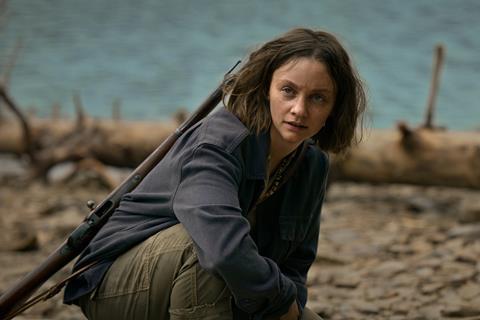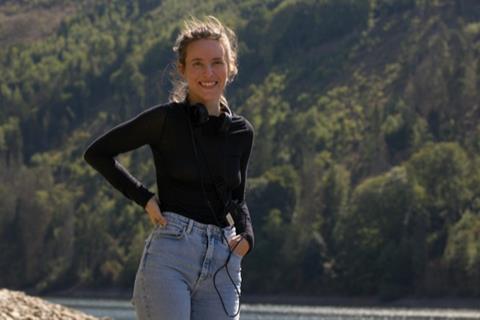
Dystopian drama Milk Teeth, which is making its world premiere in the Big Screen competition at this year’s International Film Festival Rotterdam (IFFR) and is also playing at Göteborg Film Festival, is the debut feature of Swiss filmmaker Sophia Bösch.
Set in an isolated rural community, far from a world that may no longer exist, Milk Teeth follows a woman who has gained the respect of the community despite being born to an ‘outsider’ mother. But that respect is put at risk when she finds a mysterious girl in the local woods. It is an adaptation of Helene Bukowski’s 2021 novel and stars Mathilde Bundschuh, Susanne Wolff, Ulrich Matthes and Viola Hinz.
Written by Bösch and Roman Gielke, Milk Teeth is produced by Milena Klemke, Yvonne McWellie, Jakob D. Weydemann and Jonas Weydemann for Germany’s Weydemann Bros. Sales are being handled by LevelK.

Bösch is based in Berlin, where she studied filmmaking, and previously directed short films including 2018’s Rå.
How did you come to make Milk Teeth?
My graduation short (Rå) was about a girl who goes on a moose hunt with her father and his men for the first time, and wants to prove herself in this company of men. It went on to win the national short film award in Germany. My producer, Milena, saw it and approached me with Helene Bukowski’s novel.
I was fascinated by the novel. It’s set in a dystopian future. But it is not science fiction, more like a dark fairy tale. And it is centred around three female characters, which I thought was an interesting constellation – a mother, daughter and this other child that’s coming in. The whole aspect of nature, both as scenery and as a protagonist, also made it seem very cinematic.
How did you adapt it for the screen?
I adapted it with the screenwriter Roman Gielke, who I’d previously written the short film with. We also studied together in the same school. It took us three years. For me, the most challenging thing was that, when you want to make a film out of a novel, you always have to take away so much from the book and still try to keep this core. At the same time, as a filmmaker, you have to find your own voice in this already existing base that you’re using.
Can you talk about some of the themes that Milk Teeth tackles?
With my filmmaking, I try to bring a female experience of the world around us to film. That’s what I know, that’s what I can talk about. Also, that doesn’t exist very much as yet in the film canon that we have.
Skalde [played by Mathilde Bundschuh] is the daughter of this outcast mother. She really wants to belong to this community, and she adapts to its rules and tries to get the respect of people, but especially of the village leader [Ulrich Matthes]. That is a phenomenon that I have been through myself, trying to please the people who are in power and trying to be a good student – or trying to be the best at things and doing so at the cost of your own integrity. But success [can come] at an expense that sometimes is not healthy. [For women], it often, also goes hand in hand with not wanting to be like their mothers, because they see how their mothers have struggled all their lives with [what] they have been trying to achieve.
It’s an extraordinary cast you have worked with How did you cast the film?
Working with the cast and the ensemble is at the heart of my filmmaking. I love that part, and also the edit. Casting was a very long process because they had to be just right for their character. And because I didn’t grow up in Germany and I haven’t been in the German film industry too long, I didn’t really know that many faces. So, I had an incredible casting director, who helped me a lot.
We also cast some people who were not actors originally, especially the child [played by Viola Hinz]. She had done a little filmmaking before. I had been looking for the right child for a very long time. I really wanted this very raw performance for her character, like a very, very rough child in a way. I saw her casting reel – she must have been seven years old - and she did an improvisation with the help of a dream catcher that she had made herself. It was so eerie and so creepy and so charming at the same time that I knew [she was the one].
How was the actual shoot?
The first challenge was to find places in Germany that had a remote look, like finding a broad river but with no houses on either side. And there had to be forest on both sides of the river. But it had to be reachable for a whole film team. Also, the houses had to be very specific - to feel like they were a little bit lost in time. One important element for me and my team was that we didn’t want it to feel like a science fiction scenario or want it to be possibly located in place and time. [We wanted] this fairytale-ish feeling.
We were location scouting for quite a long while. Also, due to funding, we were able to shoot in very different parts of Germany, in four different Bundesländer [states]. We were a travelling production.
What was the world premiere at Rotterdam like for you?
I was less nervous than when I showed the film to my main cast and to the author of the novel a month before. I was so afraid of what the book’s author [Helene Bukowski] would say because usually a film can never be as good as the book it was based on. So I was really, really nervous. But I think Helene’s very happy. She actually came to Rotterdam and attended our premiere.
I also had my newborn baby with me [at Rotterdam]. So that made it a different festival experience. I didn’t really embrace all the festival activities that you usually do as a filmmaker, trying to go to parties. Other than that, it was a beautiful experience. Our premiere was really overwhelming for me. It was also a bit of a thriller of a day. We had a rail strike Germany, so I wasn’t sure whether my team and I were going to make it in time. We finally all arrived one hour before our premiere – and it was in this huge, huge cinema, the IMAX. So, it was a lot to take in!






![The Brightest SunScreen[Courtesy HKIFF]](https://d1nslcd7m2225b.cloudfront.net/Pictures/274x183/3/5/0/1448350_thebrightestsunscreencourtesyhkiff_312678.jpg)



























No comments yet